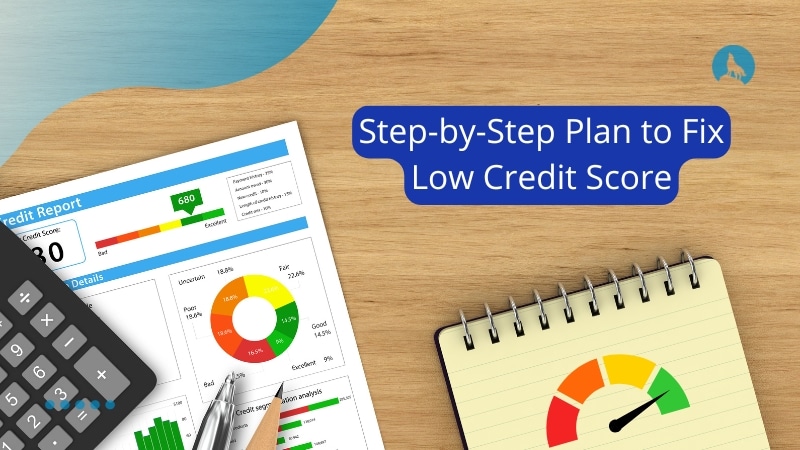Fix low credit score is more than just a financial goal, it’s a critical step toward regaining control of your personal economy and building a foundation for future stability.
Many individuals, at some point in their financial journey, encounter challenges that cause their credit scores to decline. Whether due to missed payments, unexpected debts, or lack of credit history, a low score can feel like an insurmountable barrier.
However, understanding how credit works and taking consistent, informed actions can completely change that narrative. At its core, fixing your credit is about more than numbers, it’s about rebuilding trust.
Lenders, banks, and even employers often rely on your credit profile to gauge your reliability and sense of responsibility. Therefore, when you decide to fix low credit score, you’re not just improving your financial reputation; you’re reclaiming opportunities that may have seemed closed off before.
From securing a mortgage with favorable terms to accessing business loans or even qualifying for better insurance rates, a healthy credit score unlocks doors that a poor one cannot.
Moreover, in today’s interconnected financial world, your credit score acts as a universal indicator of credibility. It reflects how disciplined you are with commitments, payments, and budgeting.
That’s why taking action to fix low credit score isn’t simply reactive, it’s proactive financial management. Every deliberate step you take toward improvement sends a strong signal to lenders that you’ve learned from past mistakes and are committed to responsible behavior going forward.
What Is a Credit Score and Why It Matters
Before you can successfully fix low credit score, it is essential to understand what a credit score truly represents, and, more importantly, why it has such a profound impact on nearly every aspect of your financial life. A credit score is not just a random number; rather, it’s a carefully calculated indicator of your creditworthiness, reflecting how reliably you manage borrowed money.
Typically, this score ranges between 300 and 850, where higher numbers signal stronger financial health and lower risk to lenders. In simpler terms, your credit score is your financial reputation.
Every loan you take, every payment you make (or miss), and even how long you’ve maintained your accounts are all recorded to build a picture of your reliability. Consequently, this number becomes a deciding factor whenever you apply for a new credit card, car loan, or even a home loan, in other words, your Credit Score for Mortgage can determine not only whether you are approved for financing but also the interest rate you’ll pay for years to come.
Moreover, it’s important to note that your credit score influences far more than borrowing capacity. For instance, landlords may use it to decide whether you’re a trustworthy tenant; insurers often rely on it to calculate risk-based premiums, and in some industries, employers review it to evaluate financial responsibility.
Therefore, maintaining a solid score is an investment in your broader economic stability. To put it differently, while cash flow measures how much money passes through your hands, your credit score measures how wisely you handle it.
As a result, when your score dips, you may face challenges such as higher loan interest rates, reduced credit limits, or even outright denials. This is why taking proactive steps to fix low credit score is not merely advisable, it’s imperative for achieving long-term financial security.
Common Reasons Why Credit Scores Drop
It is easier to address issues when you know their causes. The following are frequent reasons why people find themselves in low credit territory:
- Late or missed payments. This is one of the single biggest negative factors.
- High credit utilization. Using too much of your available credit signals risk to lenders.
- Defaults, charge-offs, or collections. These serious negative items can linger for years.
- Bankruptcy or foreclosure. These are among the most damaging to your credit history.
- Limited credit history or lacking diversity. If you have very few accounts, your score may suffer.
- As errors or identity fraud. Mistakes in the credit report or unauthorized accounts can drag your score down.
Once you have identified what’s dragging your credit down, you can begin to fix low credit score by focusing strategically on each area.
Step-by-Step Plan to Fix Low Credit Score
Rebuilding credit doesn’t happen overnight. However, by following a structured plan, you can make measurable improvement over time.

1 – Get Your Credit Report and Review It
First, you must know exactly where you stand. Request your credit report from all major bureaus (in the U.S., that means Equifax, Experian, and TransUnion). Carefully examine each account listed, paying special attention to:
- Late payments or defaults
- Accounts marked as in collections
- Inaccurate entries or unknown accounts
If you find errors, dispute them immediately with the credit bureaus and the creditor. Make sure you keep records of your dispute communication.
2 – Make Timely and Full Payments Fix Low Credit Score
Second, the most effective way to fix low credit score is to establish a perfect or near-perfect payment record. From now on:
- Set up automatic payments or reminders to avoid missing due dates
- Pay at least the minimum on all accounts each month
- When possible, pay more than the minimum to reduce balances
Over time, your payment history strengthens your credit profile.
3 – Reduce Credit Utilization Ratio
Credit utilization refers to the percentage of your total available credit you’re using. A high utilization rate (for example, above 30%) can hurt your score. To address this:
- Pay down existing balances
- Avoid charging too much on your cards
- Request credit limit increases (but avoid closing accounts)
- Open a new account only if you can manage it responsibly
By lowering utilization, you demonstrate that you’re not dependent on credit, which helps you fix low credit score.
4 – Address Collections, Charge-Offs, and Delinquencies
If you have accounts in collections or charge-offs, those can linger for years. Here’s what you can do:
- Negotiate with creditors to settle or pay in full
- Ask for “pay for delete” pay in exchange for removal of the negative item (though not all creditors agree)
- At least pay what you owe, because unpaid delinquencies will further damage your record
- Ensure the account status is updated and the negative item removed or noted as “paid”
Handling these serious issues is vital if you want to fix low credit score.
5 – Build Positive Credit with “Safe” Products
After cleaning up your negative history, start building new, positive credit lines:
- Secured credit card (requires deposit)
- Credit-builder loan (small loan where payments build credit)
- Retail card with small limit
- Become an authorized user on someone else’s account (responsibly)
Make sure you manage these responsibly, timely payments, low utilization, and no new delinquencies.
6 – Monitor Progress and Adjust Strategy
As you implement your plan, monitor your credit score regularly:
- Use free score trackers or credit bureau tools
- Review monthly statements and credit reports for changes
- Adjust your strategy if you see areas that are still lagging
Over time, your consistent efforts will help you fix low credit score and raise your credit rating.
How Long Does It Take to Improve Your Credit Score?
There is no fixed timeline for improvement—progress depends on the severity of the issues, how quickly you respond, and your consistency. However:
- Some improvements, like correcting errors or lowering utilization, can show results within a few months
- More severe derogatory items (collections, charge-offs, bankruptcies) typically take years
- Significant improvement often occurs over 12 to 24 months with disciplined behavior
Therefore, patience and consistency are crucial. While progress may be slow, every positive action contributes toward the goal to fix low credit score.
Final Thoughts
Ultimately, the journey to fix low credit score is not just a financial process, it’s a personal transformation that teaches you responsibility, discipline, and long-term planning. While the idea of rebuilding your credit might seem daunting at first, remember that every small, consistent effort contributes to a bigger picture.
Paying your bills on time, keeping your balances low, and regularly checking your credit reports are not just routine habits, they are the foundation of a healthier financial future.
Moreover, it’s crucial to understand that improvement does not happen overnight. Credit repair takes time because the system measures reliability across months and years, not weeks.
However, each positive step you take gradually replaces old mistakes with a record of responsible behavior. Over time, those improvements compound, increasing your score and expanding your access to better financial opportunities. Therefore, patience and persistence are your greatest allies in this journey.
Additionally, learning how credit works empowers you to make smarter choices in the future. Once you’ve managed to fix low credit score, you’ll find that lenders begin to view you differently, not as a high-risk borrower but as someone dependable and financially aware.
This transformation can open doors to major milestones in your life, such as buying your first home, financing a vehicle, or obtaining business credit on favorable terms. And remember, your Credit Score for Mortgage will play a key role in shaping the cost and feasibility of those dreams.
For individuals seeking official, trustworthy guidance, the Consumer Financial Protection Bureau (CFPB) offers extensive educational resources, step-by-step advice, and templates for credit report disputes. This reliable source ensures that you stay informed and protected throughout your financial rebuilding process.



